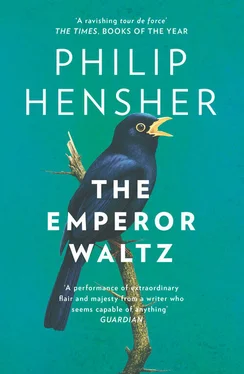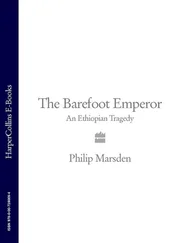Philip Hensher - The Emperor Waltz
Здесь есть возможность читать онлайн «Philip Hensher - The Emperor Waltz» — ознакомительный отрывок электронной книги совершенно бесплатно, а после прочтения отрывка купить полную версию. В некоторых случаях можно слушать аудио, скачать через торрент в формате fb2 и присутствует краткое содержание. Жанр: unrecognised, на английском языке. Описание произведения, (предисловие) а так же отзывы посетителей доступны на портале библиотеки ЛибКат.
- Название:The Emperor Waltz
- Автор:
- Жанр:
- Год:неизвестен
- ISBN:нет данных
- Рейтинг книги:3 / 5. Голосов: 1
-
Избранное:Добавить в избранное
- Отзывы:
-
Ваша оценка:
- 60
- 1
- 2
- 3
- 4
- 5
The Emperor Waltz: краткое содержание, описание и аннотация
Предлагаем к чтению аннотацию, описание, краткое содержание или предисловие (зависит от того, что написал сам автор книги «The Emperor Waltz»). Если вы не нашли необходимую информацию о книге — напишите в комментариях, мы постараемся отыскать её.
The Emperor Waltz — читать онлайн ознакомительный отрывок
Ниже представлен текст книги, разбитый по страницам. Система сохранения места последней прочитанной страницы, позволяет с удобством читать онлайн бесплатно книгу «The Emperor Waltz», без необходимости каждый раз заново искать на чём Вы остановились. Поставьте закладку, и сможете в любой момент перейти на страницу, на которой закончили чтение.
Интервал:
Закладка:
One day he could no longer stand it. It was a hot day in early summer and he had, as it were, fooled himself into coming to work. All the way from his second-floor flat in Brondesbury, he had told himself what a beautiful morning it was, how lucky he was to be walking in the sun, what a joy London could be on these days. He admired the boys in their shorts and vests; they might have been on their way to the Heath or to an open-air swimming pool, and Duncan might have been going with them. He had performed this mental trick before, pushing what he did not want to think about to the back of his mind – his father, Christmas, what Mr Mansfield his supervisor had said to him the day before. He had performed the trick with his job as he did now, putting it quite out of his mind and letting his feet trace a route without thinking what was at the end of it. In his bag was a Tupperware box of lunch, in his pocket a Baldwin novel: he might have been saving the two for a read under a tree with a picnic, not an hour in the staff room at lunchtime. It was only when he was in the street of the unemployment office, almost before the staff door, which was to the side of the locked public door, that he remembered he was not going to the Heath, not going to swim, not going to take his clothes off with the boys of London today. He was going to sit in his neat white short-sleeved shirt and tie with his suit trousers on, and listen to the failures of society asking for more money.
‘Did you see that programme on last night?’ Marion was saying, as she puffed up behind him. She was a colleague at the same level as him. She had been there longer – it had been a mysterious amount longer for some time – and had a tendency to explain ordinary things to him, where the coffee money was kept, where the better sandwich shop was at lunchtime, how it was important to stay calm and not raise your voice even when they deserved killing, really. He had in the end discovered that she had started working there three months and two weeks before him. Some still older hands probably regarded the pair of them as having the same sort of newness. He could see it happening when, as time passed, still newer colleagues, processors and analysts and form-fillers, arrived in batches.
‘I don’t think I did,’ Duncan said. ‘I was catching up with some ironing I should have done at the weekend. Terrible, really.’ He held the door open for her.
‘Oh, it was incredible,’ Marion said, coming in and removing her headscarf. Her hair stuck to her scalp. ‘I couldn’t believe it. It was a programme about nudists, all over the world. All of them, all on holiday, like that, like the day they were born. Hello, Frank.’
On the stone steps just inside the unemployment office, Duncan made up his mind without intending to. The steps were just the same as they had been at his grammar school. They spoke institution. He was smiling and trying to show an interest in a forty-year-old woman watching a television documentary about nudists and saying hello politely to a man with a scruffy beard who commuted every day from St Albans. The man looked at him in return with painful disapproval, hardly greeting him. The man’s name he had always believed to be Fred and perhaps he really was called Fred, since Marion never listened to anything she was told. Duncan had been the subject of institutions before, and now, as he easily absorbed himself into the flow of the institution before the locked doors opened, he felt himself to be the easy agent of those institutions. And that would not do. It was as if he had become a schoolteacher, but without the power of doing good in the world. He would spend a glorious sunny day inside, looking at high windows through which the light fell, looking down at men who smelt, at women who had slept in their clothes, at people begging for money just to feed their kiddies because they were desperate and they didn’t know where the next meal was coming from. There would be students coming in soon, pretending to be interested in getting a job between their summer and their autumn terms. There would be people who had been sacked and people who could not work through injury not their fault. He would sit in the sad, echoing hall on the other side of his desk. He thought of all those people and he really did not give a shit about any of them.
Going into his office he realized that there was no reason why he should not resign from his job and go to work in Sicily. Teaching English. It could hardly be any worse than here. And why Sicily? It was cheap, Duncan knew; it spoke Italian, which he had a smattering of. But mostly Duncan thought of Sicily because he had, the week before, picked up an off-duty Sicilian waiter in a gay pub on St Martin’s Lane, and the island, now, for him, was a land full of lemons, oranges and waiters called Salvatore. By half past ten he had told an overweight woman looking for employment in the legal field that she was wasting everyone’s time and should aim much, much lower. By eleven he had gone to see his supervisor, and had told him that he wanted to resign at the end of the month. By six thirty he was in the same gay pub on St Martin’s Lane – he had phoned up everyone he could think of on their office numbers – and he was telling a thrilled group of twenty men with moustaches, almost all with checked shirts on, just what he had done and where he was going to go.
‘You’ve got some nerve,’ Paul said, coming back from the bar with a half of lager and lime and a pint of bitter for Duncan. ‘I wish I had your nerve, even a bit of your nerve.’
‘If you only had a bit of his nerve,’ Simon said, ‘that’d only get you to the Isle of Wight, not much of a life-change, that, I don’t think.’
‘Cheek!’ Paul said.
Even Andrew had come, though it was his night for his men’s group, and he never liked to miss that. Or was it revolutionary politics? ‘I’ll come to that some time,’ Paul said. ‘Sounds like a right laugh.’ Anyway, it was a fantastic turn-out, and they were still there at closing time, most of them. Why Sicily? Why not.
3.
Sicily had spoken to him on the fourth day, exactly as he had known it would. He had gone to see his father in his falling-down old house in Harrow the day before he left, to tell him – after he had left the unemployment job – that he was going to the other side of Europe. He had dreaded it, but it wasn’t, in the end, so bad. His father was not what he had been. His shoulders had narrowed, and surely he had grown shorter. His hair fell in a solid lump away from his forehead, not washed for some days. As always, he had immediately started talking about himself. ‘When I started work in the insurance company,’ he said, ‘there was a man there who was a great friend of mine. He admired me immensely. “I just don’t know how you manage to get through all the work you do,” he used to say. When I managed to get out of going into the army, he was drafted in. And he –’ his father reached for a handkerchief, sitting in a damp crumple on the walnut card table by the side of his habitual mustardy winged armchair ‘– he went into Sicily. The first wave of the liberation. He never spoke about it to me when he came back. By then I had made myself useful in all sorts of ways, and I was his superior by a good distance when he returned to his post, but I always let him call me by my Christian name, if no one was around, and I think he appreciated that a great deal. My father always said to me – your grandfather – he said, “Treat your subordinates with courtesy, and they will treat you with respect.” And I believe I’ve always done precisely that.’
Duncan waited to hear something about Sicily. There in his father’s mind, there was an irritating fly, buzzing about, a tiny fly, not visible, but audible, and introduced into the normal furniture and spaces of the mind without warning. The name of the fly – what was it? It was Sicily. But in time it proved to go quite harmoniously with all the furniture that was already in the room, and could really safely be ignored.
Читать дальшеИнтервал:
Закладка:
Похожие книги на «The Emperor Waltz»
Представляем Вашему вниманию похожие книги на «The Emperor Waltz» списком для выбора. Мы отобрали схожую по названию и смыслу литературу в надежде предоставить читателям больше вариантов отыскать новые, интересные, ещё непрочитанные произведения.
Обсуждение, отзывы о книге «The Emperor Waltz» и просто собственные мнения читателей. Оставьте ваши комментарии, напишите, что Вы думаете о произведении, его смысле или главных героях. Укажите что конкретно понравилось, а что нет, и почему Вы так считаете.












